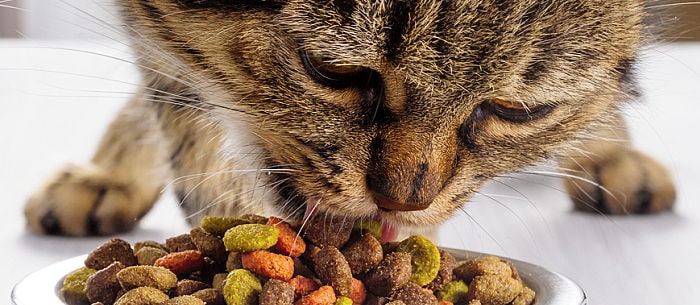Feeding your cat each day may seem like a monotonous routine, but there’s a lot about your feline friend’s nutrition that you may not know. Understand that, often, the questions “What do cats eat?” and “What should they be eating?” have two different answers.
What Do Cats Eat?
While you may not want to think of Fluffy as a hungry carnivore, that’s reality, says Dr. Cecilia Burnside of Austin-based Cats Love Housecalls veterinary service. “Cats are obligate carnivores,” she says. “They are required to take in a certain amount of proteins, amino acids, and fats. If not, they can end up with heart disease or other illnesses.” When it comes to feeding your cat, experts say you need to worry less about them eating vegetables and more about the amount of protein they consume.
“Your cat is a hunter of animals,” agrees Dr. Geri Katz, owner of AristoKatz Veterinary Care for Cats in Fairfield, Connecticut. “They don’t need blueberries or flaxseed. If cats could, they would eat seven mice a day.” They also eat often. It can be dangerous for cats to go more than 24 to 48 hours without food, says Dr. Katz, because cats can go into liver failure quickly.
What Shouldn’t Cats Eat?
Indeed, cats process protein more efficiently than carbohydrates. Like humans, cats that eat too many carbs can often end up overweight with diabetes, which is why Dr. Katz recommends that a whole animal protein is the first ingredient in whatever you feed your pet. While dry food is typically cheaper and more convenient to feed your cat, Dr. Katz points out that canned food contains essential moisture cats need (they are not big water drinkers to begin with) and higher levels of protein.
If cats don’t get enough moisture, they may end up with urinary tract problems. Dry food typically has higher levels of carbohydrates and sugars and less animal protein. “When you feed a cat a diet high in carbohydrates, it’s hard for them to fill up,” Dr. Katz says. “Protein is just a much more efficient way to derive energy.”
What “Can” Cats Eat?
One drawback of canned food, however, is that your cat may simply refuse to eat it. “A cat that has been on dry food for 13 years may not switch to canned food,” Dr. Burnside says. Also, canned cat food sometimes also contains wheat, which may cause stomach problems for your kitty, Dr. Katz says. If that’s the case, try to find a canned food without additives. Since you can’t just leave canned food out for the weekend while you’re away, make sure you have a cat sitter come check on your feline and make sure they get their daily serving.
Neither Dr. Burnside nor Dr. Katz recommends making your own cat food at home because essential amino acids and minerals are added to store-bought food. Without those nutrients, your cat is at risk of going blind or developing heart problems. However, Dr. Katz says it’s fine to give your pet raw meat, cold cuts, boiled chicken, or even tuna as treats — as long as it doesn’t seem to cause stomach upset.
You can feed your cat a balanced raw diet with store-bought food, Dr. Burnside says. Make sure it has the Association of American Feed Control Officials approval label. Raw diets do pose a contamination risk, however, so proper handling is necessary. An ideal diet for your cat, according to Dr. Burnside, is one that your cat will eat and that contains protein, fats and moisture.
Dietary Changes as Your Cat Ages
Kittens need more protein and fat than adult cats, as they are growing and burn more energy. As an adult, your cat needs less fat, but the protein is still vital. Older cats need more protein because it’s more difficult for them to absorb as they age.
As long as your cat’s diet comprises high-quality balanced foods from the pet store, your kitty shouldn’t need any supplements for vitamins and minerals. Dr. Katz recommends Catinfo.org, a website put together by a veterinarian, that offers a detailed insight into cat food ingredients. Of course, it’s always a good idea to reach out to your vet when it comes to your cat’s individual needs.
Simply put, you shouldn’t need to go too much out of your way to ensure your cat is eating a healthy diet. Whole animal protein is the most important food for cats throughout their lives. “Just feed them what they want to be eating, what they would be eating in the wild,” Dr. Katz says. “We domesticated these cats, brought them indoors and fed them cereal. They derive their energy best from animal protein. That is pretty much their reason for living.” That and, of course, snuggling with you.
Need recipe ideas for your cat? Here are 10 Easy Homemade Cat Treats Your Cat Will Love.
Bayan Raji is a freelance writer.
* This article is for general informational purposes only. It is not intended nor implied to be providing medical advice and is not a substitute for such advice. The reader should always consult a health care provider concerning any medical condition or treatment plan. Neither Care.com nor the author assumes any responsibility or liability with respect to use of any information contained herein.


